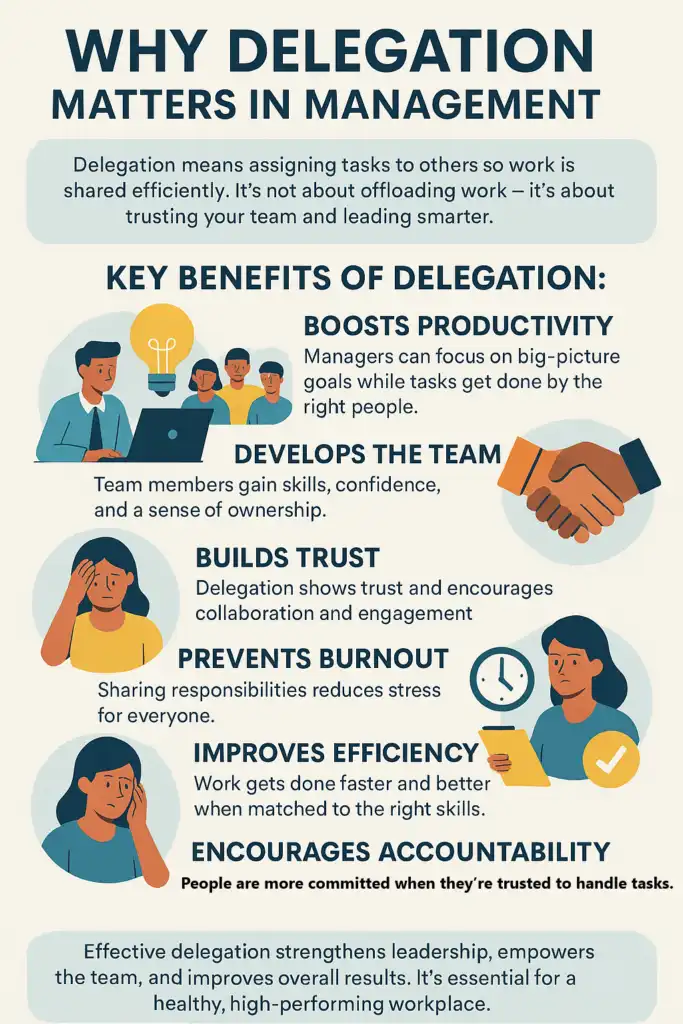The Importance of Delegation in Effective Management
Delegation means giving tasks or responsibilities to someone else, usually a team member. In management, delegation is not about “dumping” work on others, but about trusting your team to handle important tasks so that everyone works more efficiently. It’s a key leadership skill that helps a manager focus on the bigger picture while empowering their team to grow and succeed.

1. Why Delegation Matters
Managers can’t (and shouldn’t) do everything themselves. Trying to take on too much leads to stress, burnout, and mistakes. Delegation helps lighten the load and makes sure the right people are doing the right tasks. This leads to better time management and overall productivity.
2. Helps Develop Team Members
When you delegate tasks, you give your team members a chance to learn new skills, take on responsibility, and grow in confidence. It shows that you trust them, which boosts morale and engagement.
3. Focuses Manager on What Matters Most
By handing off routine or lower-priority tasks, managers can focus on more strategic things like planning, problem-solving, or improving processes. This makes the whole team stronger because the manager is leading more effectively.
4. Builds Trust and Collaboration
Delegation encourages open communication and teamwork. When done right, it creates a culture where team members feel valued and supported. They’re more likely to contribute ideas and take initiative.
5. Encourages Accountability
Delegation also promotes a sense of ownership. When someone is trusted with a task, they’re more likely to take responsibility and do their best work. It also makes it easier to track progress and performance.
6. Avoids Burnout
Managers who try to do everything themselves often get overwhelmed. Delegation reduces stress, prevents burnout, and creates a healthier work-life balance for both the manager and the team.
7. Increases Efficiency
When tasks are delegated to the right people—those with the right skills or interests—things get done faster and more accurately. This boosts overall team efficiency and helps the business run more smoothly.
Summary:
Delegation is a crucial part of effective management because it helps managers share responsibilities, improve productivity, and focus on higher-level tasks. It also allows team members to grow, learn new skills, and feel more trusted and valued. Good delegation builds stronger teams, promotes accountability, and prevents burnout by reducing the workload on the manager. When tasks are assigned to the right people, the work gets done faster and better. In short, delegation is not just about handing off tasks—it’s about building trust, improving performance, and making the entire team more successful.
Tags: accountability, building trust, burnout, business operations, Business Productivity, business success, collaboration, Communication, confidence, culture, Decision Making, delegation, delegation effectiveness, delegation process, delegation strategy, Efficiency, employee confidence., employee development, employee empowerment, engagement, goal achievement, growth, interests, job delegation, job empowerment, job satisfaction, Leadership & Management, leadership approach, leadership challenges, leadership development, leadership effectiveness, leadership impact, leadership skill, leadership trust, learning new skills, management, management efficiency, management success, manager focus, manager’s role, managerial focus, managerial responsibilities, Managerial Skills, managerial skills.Empowerment, mistakes, morale, organizational efficiency, organizational growth, ownership, Performance Improvement, performance management, personal development, planning, problem-solving, process improvement, process optimization, productivity, professional growth, progress tracking, project management, resource allocation, resource management, resource optimization, responsibilities, responsibility, responsibility delegation, responsibility sharing, role clarity, Skill development, skills, staff accountability, strategic focus, stress, task assignment, task completion, task delegation, task delegation benefits, task distribution, task execution, task ownership, task prioritization, task responsibility, tasks, team autonomy, team capacity, team collaboration, Team Coordination, Team Development, team dynamics, team engagement, team member, Team motivation, team performance, team strength, team success, Time Management, time optimization, trust, trust-building, work delegation, work distribution, work-life balance, workload distribution, workload management, workplace balance


